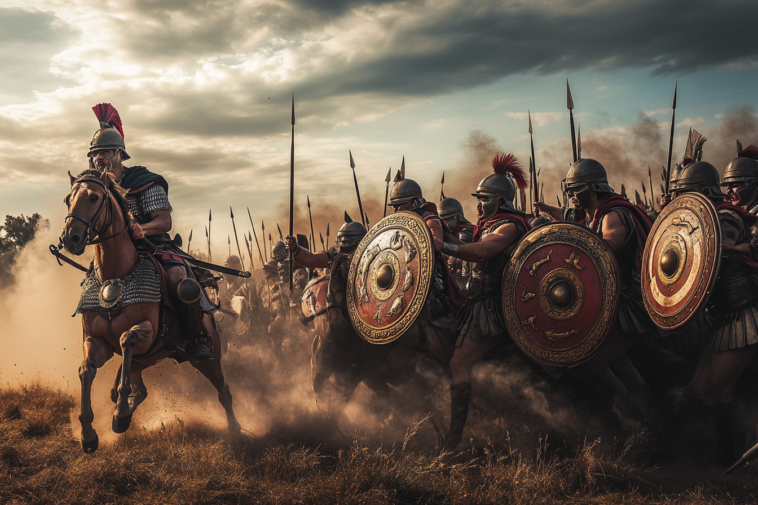
Throughout history, some battles have done more than just decide the outcome of wars—they’ve also changed the fate of empires and shaped the direction of entire civilizations.
Let’s take a closer look at ten key battles that have had a lasting impact on world history.
1. Battle of Gaugamela (331 BCE)
Empires involved: Macedonian Empire vs. Persian Empire
In 331 BCE, Alexander the Great faced off against King Darius III of Persia near a place called Gaugamela.
Although Alexander’s army was smaller, his brilliant military strategies led to a decisive victory.
This battle marked the downfall of the mighty Persian Empire and allowed Alexander to expand his empire across a vast portion of the world.
The victory also played a significant role in spreading Greek culture (known as Hellenism) throughout the regions he conquered, influencing art, philosophy, and education for centuries.
2. Battle of Cannae (216 BCE)
Empires involved: Roman Republic vs. Carthaginian Empire
The Battle of Cannae in 216 BCE is considered one of the greatest military tactics in history.
Hannibal, the Carthaginian general, trapped and destroyed a much larger Roman army through brilliant strategy.
He positioned his forces in a way that allowed him to encircle the Romans and deliver a crushing blow.
This battle became a textbook example of military strategy, showing that even the mightiest armies, like Rome, had weaknesses that could be exploited.
Despite their defeat, Rome would eventually recover, but the battle remains a powerful lesson in the importance of tactics over numbers.
3. Battle of Tours (732 CE)

Empires involved: Frankish Kingdom vs. Umayyad Caliphate
In 732, the Frankish leader Charles Martel led his forces to stop the expansion of the Umayyad Caliphate, a powerful Muslim empire, into Western Europe.
At the Battle of Tours, Martel’s army managed to defeat the Umayyads, preventing the spread of Islam into Europe.
This victory was significant for preserving Christianity in the region and establishing the Franks as a powerful force in Europe, eventually leading to the formation of the Holy Roman Empire.
The battle is often seen as a turning point that shaped the religious and cultural future of Europe.
4. Battle of Hastings (1066 CE)
Empire involved: Norman Conquest of England
In 1066, William, the Duke of Normandy, fought and defeated King Harold II of England at the Battle of Hastings.
This victory was monumental because it resulted in the Normans taking control of England.
The consequences of this battle were far-reaching, as the Normans brought new cultural practices, a different system of governance, and significant changes to the English language.
The Normans also built many castles and established feudalism, which transformed the structure of English society and governance for centuries.
5. Battle of Agincourt (1415 CE)
Empires involved: England vs. France
During the Hundred Years’ War, King Henry V of England led his forces to a stunning victory against a much larger French army at the Battle of Agincourt in 1415.
The English longbowmen played a crucial role in this victory, allowing the smaller English force to defeat the French despite being outnumbered.
The battle became a symbol of national pride for England and is remembered for its display of military innovation.
It also shifted the balance of power in the war, giving the English a crucial advantage and eventually leading to the signing of the Treaty of Picquigny in 1475, which ended the conflict.
6. Siege of Constantinople (1453 CE)

Empires involved: Ottoman Empire vs. Byzantine Empire
In 1453, the Byzantine Empire, which had lasted for over a thousand years, fell when the Ottoman Empire captured its capital, Constantinople.
The Ottomans, led by Sultan Mehmed II, laid siege to the city and eventually breached its walls, marking the end of the Byzantine Empire.
This victory allowed the Ottomans to dominate Eastern Europe and the Mediterranean for centuries.
The fall of Constantinople also had a huge impact on Europe—trade routes to the East were cut off, prompting European nations to seek new paths to Asia.
This shift in trade routes played a crucial role in the Age of Exploration, leading to the discovery of new lands and the expansion of European influence across the globe.
7. Battle of Waterloo (1815 CE)
Empires involved: Seventh Coalition vs. French Empire
The Battle of Waterloo in 1815 marked the end of Napoleon Bonaparte’s reign.
After years of conquering much of Europe, Napoleon faced a combined force of European nations, known as the Seventh Coalition, at Waterloo.
Despite his brilliance as a general, Napoleon was defeated, and this loss ended his rule over France.
The aftermath of the battle led to the Congress of Vienna, where European powers gathered to redraw borders and create a balance of power in Europe.
This agreement helped maintain peace in Europe for much of the 19th century, preventing major wars for decades.
8. Battle of Stalingrad (1942-1943 CE)
Empires involved: Soviet Union vs. Nazi Germany
The Battle of Stalingrad during World War II became one of the most brutal and decisive confrontations in history.
It lasted from 1942 to 1943 and was fought between the Soviet Union and Nazi Germany.
The Germans, who were advancing through the Soviet Union, were stopped in Stalingrad, and the Soviet forces surrounded and defeated them.
This victory marked the beginning of the Nazi decline on the Eastern Front.
Stalingrad also became a symbol of Soviet resilience and determination.
The battle’s outcome significantly impacted the course of the war, shifting the balance of power in favor of the Allies and setting the stage for the Soviet Union’s growing influence in Eastern Europe in the years to come.
9. Battle of Midway (1942 CE)

Empires involved: United States vs. Japan
The Battle of Midway, fought in June 1942, was a major turning point in the Pacific Theater of World War II.
The United States, using intelligence to predict Japan’s next move, ambushed and decisively defeated the Japanese navy near the Midway Atoll.
The loss of four Japanese aircraft carriers drastically weakened Japan’s naval power, halting its expansion across the Pacific.
This victory marked a shift in naval dominance and was crucial in the eventual defeat of Japan.
Midway is considered one of the most important naval battles in history, helping to turn the tide of the war in favor of the Allies.
10. Battle of El Alamein (1942 CE)
Empires involved: Allied Forces vs. Axis Powers
The Second Battle of El Alamein, fought in North Africa in 1942, was a pivotal moment in the Western Desert Campaign during World War II.
The Allied forces, under the leadership of British General Bernard Montgomery, successfully halted the Axis forces led by German Field Marshal Erwin Rommel.
This victory ended Axis ambitions in the Middle East and safeguarded the Suez Canal, a crucial link for oil supplies and transportation between Europe and Asia.
The battle marked the beginning of the Allies’ push eastward, ultimately leading to the defeat of the Axis powers in North Africa and paving the way for the invasion of Italy.
Final Thoughts
Throughout history, battles across different eras and regions have shaped the rise and fall of empires, influencing the world we live in today.
Studying these key moments helps us understand how strategy, leadership, and unforeseen events come together to shape the course of history.



